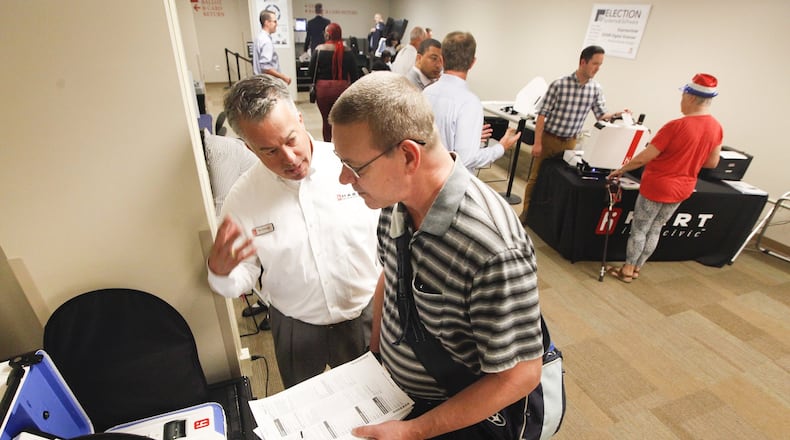“All the (possible new) systems are paper-based, which is trending throughout not only Ohio but throughout the nation,” Kelly said. “People like to hold on to something that is tangible, and they trust that. If they can hold onto their vote and scan it themselves, they seem to like that.”
MORE: Dayton to host first governor debate at UD
But each of the systems being considered — Election Systems & Software, Hart Intercivic and Unisyn — also offer hybrid capabilities in which a voter can mark a paper ballot with a pen or cast votes on a touchscreen that marks ballots. All the ballots then go through a scanner for counting.
David Chambers of Huber Heights was among dozens trying out the new systems at the Board of Elections office.
“What I like about the systems is it gives voters a choice,” said Chambers, who retired from the Air Force in 2003 and is now a poll worker. “The one that wants to be more involved gets a blank ballot and fills it out. For the elderly or those not quite capable of hand-filling out a ballot, it can fill it out for them just like the current touchscreens and have it tabulated at the end. I like that they have both options.”
Kelly said the hybrid touchscreen models will almost definitely be purchased for early voting at the elections board office, and some are likely to be deployed to precincts as a choice for voters. Cost will determine how many hybrid models can be purchased for each precinct, but each precinct would be treated equally, she said.
Former Dayton Mayor Rhine McLin, current chair of the Board of Elections, said staff members will analyze the feedback from Tuesday’s “Mock Election Open House,” and the results will be a factor in the board’s final decision.
RELATED: Paper ballots likely to replace touchscreen voting for many area voters
“I think the people will be very pleased to see that their opinion is really going to count with the board of elections,” she said. “This is the future of elections for the next 15 years or more. So this is why it’s so important people participated in this mock election.”
No final decision can be made until Oct. 29, when the state law giving counties access to $114.5 million for election equipment takes effect, said Steve Harsman, Montgomery County’s assistant elections director.
Harsman said the county hopes to have a final decision by the end of November with delivery of new equipment early next year in time for the May 2019 election. The county will also purchase new poll book equipment, which was also tested Tuesday.
Replacing all of Montgomery County’s current voting equipment is projected to cost $8 million, according to officials. The county is expected to receive $4.2 to $4.5 million in state funding, according to elections officials. The state is in the process of negotiating the final costs with the vendors and the 88 county elections boards.
MORE: Ohioans may have to dig deep to cover cost of new voting machines
Election integrity is also a concern across the state and nation, prompting officials to want the new equipment tested and proven before the next presidential election, a desire shared by Patricia Randall, a county poll worker from Kettering who tried out the systems Tuesday.
“I want to see how they work. Because you have to help other people there,” Randall said. “And this is going to be all new to them, especially in 2020, because you get hammered on a big election. They hope it will be in place for 2019. So it will be smaller election, but still, it’s a learning curve.”
About the Author

